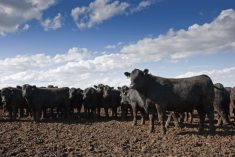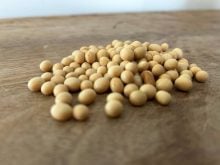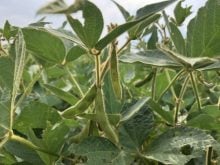For the week ending Saturday, western Canadian yearling steer prices were quoted $2-$4 higher; yearling heifers traded $2 higher to $5 lower. Calves were relatively unchanged although volumes were limited. Larger groups of quality genetics were well bid while second tier cattle were marginally discounted off the highs. Some ranches are liquidating yearlings about one month earlier than normal due to drier conditions. The market has easily absorbed the unexpected volume with fed cattle prices near historical highs. New-crop corn prices are under pressure while barley offers for September forward are hard to come by. Interest costs are composing $70-$80 per head on pen closeouts. The cost per pound gain is relatively unchanged from last year as higher interest charges offset lower feed grain prices. This has made the nearby feeder market dependent on deferred live cattle futures. The Canadian dollar has been strengthening as well, which has tempered the upside in the feeder market. We received no reports from Saskatchewan or Manitoba last week. There was a jump in U.S. calf markets last week and we now find Nebraska calf prices premium to Alberta.
Read Also

U.S. grains: CBOT soybeans, corn, wheat fall in USDA data aftermath
Chicago grains took a dive on Friday, following a closely watched U.S. government crop report and the release of export data that could provide clues into Chinese buying.
In central Alberta, larger-frame lower-flesh steers on silage diet with full health records averaging 940 lbs. sold for $294. In the same region, medium- to larger-frame, light-butter mixed heifers averaging 945 lbs. on forage diet with full processing data were last bid at $255. North of Calgary, tan steers on forage diet with known processing records averaging 881 lbs. silenced the crowd at the psychological level of $300.
Near Lethbridge, black steers off grass weighing 765 lbs. were quoted at $331. Southeast of Calgary, Charolais-blended heifers averaging 770 lbs. were valued at $292.
South of Edmonton, mixed weaned steers on the board at 690 lbs. notched the charts at $340 and mixed heifers averaging 650 lbs. were stopped at $320. In the same region, Charolais-based weaned steers with a reported scale weight of 605 lbs. reached up to $382. Again, these are values for top-quality cattle; stragglers and small groups of various sorts were discounted accordingly. Feedlots don’t want to contend with off-grade cattle.
Alberta packers were buying fed cattle on a dressed basis at an average prices of $406/cwt delivered this past week. This was down from the June 22 high of $415/cwt. Wholesale beef prices have softened; however, beef demand remains strong due to job growth and the year-over-year increase in wages. Inflation and energy prices are down from year-ago levels, providing the consumer with additional buying power.
— Jerry Klassen is president and founder of Resilient Capital, specializing in proprietary commodity futures trading and market analysis. Jerry consults with feedlots on risk management and writes a weekly cattle market commentary. He can be reached at 204-504-8339 or via his website at ResilCapital.com.















